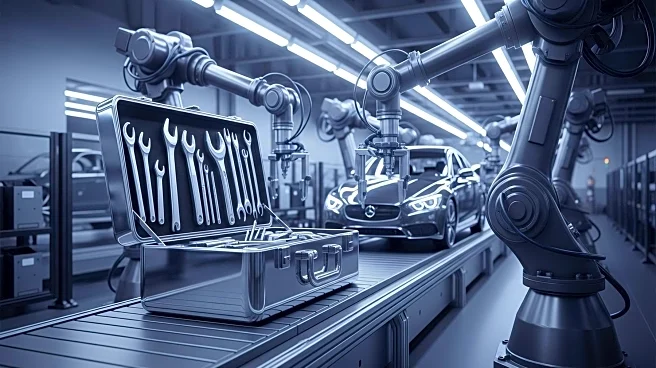What's Happening?
Ford CEO Jim Farley has expressed concern over the labor shortage crisis affecting Gen Z workers, particularly in blue-collar jobs. During the Ford Pro Accelerate event, Farley shared his realization about the challenges faced by young factory employees, many of whom are forced to work multiple jobs to make ends meet. He noted that entry-level workers at Ford often have to take additional jobs at places like Walmart and Amazon fulfillment centers, leading to insufficient sleep and financial instability. Farley emphasized the need for full wages for entry-level workers and highlighted the broader issue of a nationwide shortage of skilled technicians and factory workers. He pointed out that millions of well-paid jobs remain unfilled due to the lack of specialized skills, and stressed the importance of training and vocational education to address this gap.
Why It's Important?
The labor shortage crisis highlighted by Farley has significant implications for the U.S. economy and workforce development. The shortage of skilled workers in essential trades could hinder economic growth and infrastructure development, particularly in sectors driven by artificial intelligence and data centers. Farley's call for increased investment in vocational education and apprenticeship programs underscores the need for a shift in educational priorities to meet the demands of the modern economy. The crisis also reflects broader societal challenges, including the erosion of stable, single-income careers and the need for policy changes to support workforce development. Addressing these issues is crucial for ensuring economic stability and providing opportunities for younger generations.
What's Next?
Farley has urged large employers and community leaders to take action by investing in vocational education and apprenticeship programs. He highlighted the need for collaboration between local governments and businesses to overcome bureaucratic hurdles and improve productivity in the essential economy. Despite President Trump's push to prioritize trade schools over four-year degrees, Farley noted that progress at the federal level has been slow. He emphasized the importance of local initiatives and expressed optimism about the momentum among mayors and county leaders, although resources remain limited. The focus will likely be on developing strategies to attract young people to skilled trades and ensuring they receive adequate training.
Beyond the Headlines
The labor shortage crisis has deeper implications for societal values and the perception of blue-collar work. Farley's remarks reflect a shift in the traditional view of blue-collar jobs as stable and prideful careers. The need for multiple jobs to sustain a living challenges the notion of work-life balance and raises questions about the sustainability of current economic models. The emphasis on vocational education and apprenticeships may lead to cultural shifts in how education and career paths are valued, potentially reducing the stigma associated with non-degree careers and promoting a more diverse workforce.










